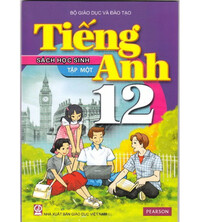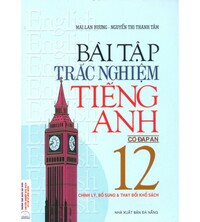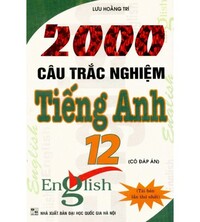Tiếng Anh 12 Unit 4 4.6 Use of English
1. Think about how the weather affects human hyperactive hypersensitive behaviour. Choose the option you think is correct. 2. Read the blog and check your ideas in Exercise 1.3. Read and complete the LANGUAGE FOCUS with the examples in blue in the blog.
Bài 1
1. Think about how the weather affects human hyperactive hypersensitive behaviour. Choose the option you think is correct.
(Hãy nghĩ xem thời tiết ảnh hưởng như thế nào đến hành vi quá mẫn cảm của con người. Chọn tùy chọn mà bạn cho là đúng.)
1. Rainy / Sunny weather makes you sleepy.
2. Rainy / Sunny weather makes you hungry.
3. Rainy / Sunny weather makes you more violent.
4. Calm / Stormy weather makes children hyperactive.
5. Dull / Sunny weather makes your memory better.
6. Rainy / Sunny weather makes you feel comforted.
Lời giải chi tiết:

1. Rainy weather makes you sleepy.
(Trời mưa khiến bạn buồn ngủ.)
2. Rainy weather makes you hungry.
(Trời mưa khiến bạn đói bụng.)
3. Sunny weather makes you more violent.
(Trời nắng khiến bạn bạo lực hơn.)
4. Calm weather makes children hyperactive.
(Thời tiết ôn hòa khiến trẻ hiếu động.)
5. Sunny weather makes your memory better.
(Trời nắng giúp trí nhớ của bạn tốt hơn.)
6. Sunny weather makes you feel comforted.
(Thời tiết nắng khiến bạn cảm thấy dễ chịu.)
Bài 2
2. Read the blog and check your ideas in Exercise 1.
(Đọc blog và kiểm tra ý tưởng của bạn trong Bài tập 1.)
HOW WEATHER AFFECTS HUMAN BEHAVIOUR
Are you incapable of getting up in the morning? That may be because it's raining, and the absence of sunlight causes the sleep hormone melatonin to be overactive. Heavy rain can also make you hungry. When it's cloudy, the hormone serotonin decreases, and you need more carbohydrates. The effect of rain on crime rates cannot be underestimated. A New York Times investigation found that crimes committed on dry days far outnumber those committed in bad weather because people (including criminals) are unwilling to go out in the rain. Perhaps we should reconsider our opinion of British weather in the light of these statistics!
High temperatures on the other hand have long been linked with an upturn in violence. Raised temperatures cause an increase in heart rates and people are less able to control their temper.
Tạm dịch:
THỜI TIẾT ẢNH HƯỞNG ĐẾN HÀNH VI CON NGƯỜI NHƯ THẾ NÀO
Bạn không có khả năng thức dậy vào buổi sáng? Đó có thể là do trời mưa, thiếu ánh nắng khiến hormone ngủ melatonin hoạt động quá mức. Mưa lớn cũng có thể khiến bạn đói. Khi trời nhiều mây, hormone serotonin giảm và bạn cần nhiều carbohydrate hơn. Không thể đánh giá thấp ảnh hưởng của mưa đối với tỷ lệ tội phạm. Một cuộc điều tra của tờ New York Times cho thấy tội ác xảy ra vào những ngày khô ráo nhiều hơn nhiều so với những tội phạm xảy ra trong thời tiết xấu vì mọi người (bao gồm cả tội phạm) không muốn ra ngoài trời mưa. Có lẽ chúng ta nên xem xét lại quan điểm thứ năm của mình về thời tiết ở Anh dựa trên những số liệu thống kê này!
Mặt khác, nhiệt độ cao từ lâu đã có liên quan đến sự gia tăng bạo lực. Nhiệt độ tăng cao khiến nhịp tim tăng cao và con người ít có khả năng kiểm soát tính khí của mình.
Bài 3
3. Read and complete the LANGUAGE FOCUS with the examples in blue in the blog.
(Đọc và hoàn thành TẬP TRUNG NGÔN NGỮ với các ví dụ màu xanh lam trong blog.)
|
LANGUAGE FOCUS Prefixes Prefixes can be added to the same root word to create different words. For example from the root word use you can form reuse and misuse.
|
Lời giải chi tiết:

|
LANGUAGE FOCUS (NGÔN NGỮ TRỌNG TÂM) Prefixes (Tiền tố) Prefixes can be added to the same root word to create different words. For example from the root word use you can form reuse and misuse. (Tiền tố có thể được thêm vào cùng một từ gốc để tạo ra các từ khác nhau. Ví dụ, từ việc sử dụng từ gốc, bạn có thể hình thành việc sử dụng lại và sử dụng sai.)
|
Bài 4
4. Match the words in the box with the correct prefixes to make twelve new words. What spelling rules can you work out for il-, im- and ir-?
(Nối các từ trong khung với các tiền tố đúng để tạo thành 12 từ mới. Bạn có thể tìm ra quy tắc đánh vần nào cho il-, im- và ir-?)
|
adequate approve aware believe (phê duyệt) (đầy đủ) (nhận thức) (tin tưởng) capable legal literate mature (có khả năng) (hiểu biết) (pháp luật) (trưởng thành) probable relevant responsible safe (có thể) (có liên quan) (có trách nhiệm) (an toàn) |
1. dis- __________, __________
2. il- __________, __________
3. im- __________, __________
4. in- __________, __________
5. ir __________, __________
6. un- __________, __________
Lời giải chi tiết:
1. disapprove, disbelieve (không tán thành, không tin)
2. illegal, illiterate (bất hợp pháp, mù chữ)
3. immature, improbable (non nớt, khó tin)
4. incapable, inadequate (không có khả năng, không đủ khả năng)
5. irresponsible, irrelevant (vô trách nhiệm, không liên quan)
6. unsafe, unaware (không an toàn, không biết)
Prefixes il-, im-, ir- (Các tiền tố il-, im-, ir-)
We commonly change the prefix in- to il-, im- or ir- when the first letter of a word is l, m, p, or r.
(Chúng ta thường thay đổi tiền tố in- thành il-, im- hoặc ir- khi chữ cái đầu tiên của một từ là l, m, p hoặc r.)
|
in becomes il- before l (in trở thành il- trước l) |
in becomes im- before m or p (in trở thành im- trước m hoặc p) |
in becomes ir- before r (in trở thành ir- trước r) |
|
illegible (không thể đọc được) illiterate (mù chữ) illogical (phi logic) |
immoral (vô đạo đức) immature (chưa trưởng thành) impossible (không thể) |
irrelevant (không liên quan) irresponsible (thiếu trách nhiệm) irreplaceable (không thể thay thế) |
Bài 5
5. Complete the two comments about the blog with the correct form of the words in brackets.
(Hoàn thành hai nhận xét về blog với dạng đúng của từ trong ngoặc.)
I don't like winter. I suffer from low (1) __________ and I fall out with friends because I'm very (SOCIAL) (2) __________. I'm (CAPABLE) (3) __________ of getting up in the morning and I know that my work is (4) ___________ because I lack concentration. I need sunshine to feel alive.
Johnny
All this weather stuff is (5) __________ for people like me. I work all day in a shop, I travel to the gym to work and back by bus and I go in the evening. I'm totally (6) __________ of the weather most of the time!
Julie
Lời giải chi tiết:

I don't like winter. I suffer from low (1) self-esteem and I fall out with friends because I'm very (2) anti-social. I'm (3) incapable of getting up in the morning and I know that my work is (4) substandard because I lack concentration. I need sunshine to feel alive.
Johnny
All this weather stuff is (5) irrelevant for people like me. I work all day in a shop, I travel to the gym to work and back by bus and I go in the evening. I'm totally (6) unaware of the weather most of the time!
Julie
Tạm dịch:
Tôi không thích mùa đông. Tôi có lòng tự trọng thấp (1) và tôi không hòa hợp với bạn bè vì tôi rất (2) chống đối xã hội. Tôi (3) không thể thức dậy vào buổi sáng và tôi biết rằng công việc của tôi (4) không đạt tiêu chuẩn vì thiếu tập trung. Tôi cần ánh nắng để cảm thấy sống động.
Jonny
Tất cả những thứ về thời tiết này (5) không liên quan đến những người như tôi. Tôi làm việc cả ngày trong một cửa hàng, tôi đi đến phòng tập thể dục để làm việc rồi về bằng xe buýt và tôi đi vào buổi tối. Tôi hoàn toàn (6) không biết về thời tiết hầu hết thời gian!
Julie
Search google: "từ khóa + timdapan.com" Ví dụ: "Tiếng Anh 12 Unit 4 4.6 Use of English timdapan.com"







